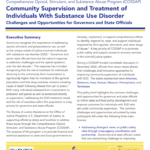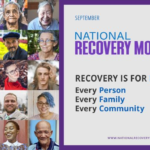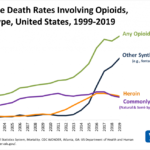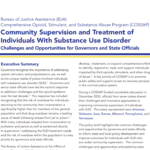
Behavioral Health
Governors play a critical role in addressing behavioral health in their state, including both mental health and substance use disorders. The Behavioral Health Program supports governor’s offices by providing evidence-informed promising and best practices that promote behavioral health to improve the lives and wellbeing of their constituents.
Since 2012, the National Governors Association Center for Best Practices has supported states in their efforts to help prevent and treat substance use disorders and overdose. The Behavioral Health team leads several initiatives that address substance use and related consequences and is supporting efforts to promote mental health and wellbeing.
Featured Initiatives
Implementing a Continuum of Care to Prevent Overdose Policy Academy
To support states with operationalizing recommendations from the publication, “Implementing a Continuum of Care to Prevent Overdose: A Roadmap for Governors” the Behavioral Health team is leading a policy academy for states. The Center will support up to four states with implementation of a policy recommendation from the roadmap through the Policy Academy, which will kick off in January 2024.
Leveraging EMS to Address Overdose Learning Collaborative
This learning collaborative will support up to four states with exploring ways EMS can expand their scope of practice to address the overdose crisis. Policies may include mechanisms that authorize EMS to dispense buprenorphine, divert patients from emergency departments and allow EMS to leave naloxone kits behind on the scenes of overdose.
Implementing State Strategies to Address Infectious Disease Due to Drug Use Learning Collaborative
This learning collaborative will support up to four states with exploring interventions that address the intersection of infectious diseases, including congenital syphilis, hepatitis-c, HIV, and drug use. This virtual collaborative kicked-off in December 2023 and will wrap up in July ‘24.
Implementing a Trauma-Informed Approach to Address Addiction and Overdose Policy Academy
This policy academy will support up to four states with identifying strategies that support a trauma-informed approach to addressing addiction and overdose. States will convene for a kick-off meeting in February 2024 and will wrap up in July 2024.
Meet The Team
- Marianne Gibson, Program Director
- Dana Heilman, Senior Policy Analyst
- Alex Entner, Policy Analyst
- Chyenne Tran, Policy Analyst
- Grace Burns, Policy Coordinator
Our Focus Areas
- Sharing evidence-based prevention, treatment, harm reduction and recovery strategies/ programs.
- Using data and evaluation in policy development to promote behavioral health.
- Mitigation of trauma and Adverse Childhood Experiences to prevent substance use.
- Promoting equity across the substance use continuum of care programs and policies.
- Expanding access to medication for opioid use disorder (MOUD).
- Identifying trends in polysubstance use and identifying comprehensive responses to addiction.
- Addressing infectious diseases related to SUD/OUD.
- Cannabis (Emerging)
Services
- Strategic planning facilitation and best practice guidance on behavioral health topics
- Strategic guidance, feedback, and meeting facilitation support to relevant advisors
- Annual Health and Human Services Summit
- Health Policy Advisors Network
- Opioid State Action Network (OSAN)
- Multi-state projects
- Customized research briefs and best practice presentations upon request
Behavioral Health Library

Improving Outcomes for Individuals with Opioid Use Disorder on Community Supervision
Substance Use Disorder and Addiction

National Recovery Month – 2021

Governors on Criminal Justice and Public Safety Issues

State of the States Opioid Survey and Analysis

